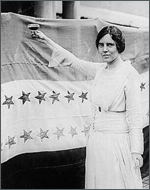

|
Alice Paul
Thursday, May 22, 2008 | Meet
Alice Stokes Paul (January 11, 1885 – July 9, 1977) was an American suffragist leader. Along with Lucy Burns (a close friend) and others, she led a successful campaign for women's suffrage that resulted in the passage of the Nineteenth Amendment to the U.S. Constitution in 1920.
In the election of 1916, Paul and the NWP campaigned against the continuing refusal of President Woodrow Wilson and other incumbent Democrats to support the Suffrage Amendment actively. In January 1917, the NWP staged the first political protest to picket the White House. The picketers, known as "Silent Sentinels," held banners demanding the right to vote. This was an example of a non-violent civil disobedience campaign. In July 1917, picketers were arrested on charges of "obstructing traffic." Many, including Paul, were convicted and incarcerated at the Occoquan Workhouse in Virginia (later the Lorton Correctional Complex) and the District of Columbia Jail.
In protest of the conditions in Occoquan, Paul commenced a hunger strike. This led to her being moved to the prison's psychiatric ward and force-fed. Other women joined the strike, which combined with the continuing demonstrations and attendant press coverage, kept the pressure on the Wilson administration. In January, 1918, the president announced that women's suffrage was urgently needed as a "war measure." Wilson strongly urged Congress to pass the legislation. In 1920, after coming down to one vote in the state of Tennessee, the Nineteenth Amendment to the United States Constitution secured the vote for women.

|


|

